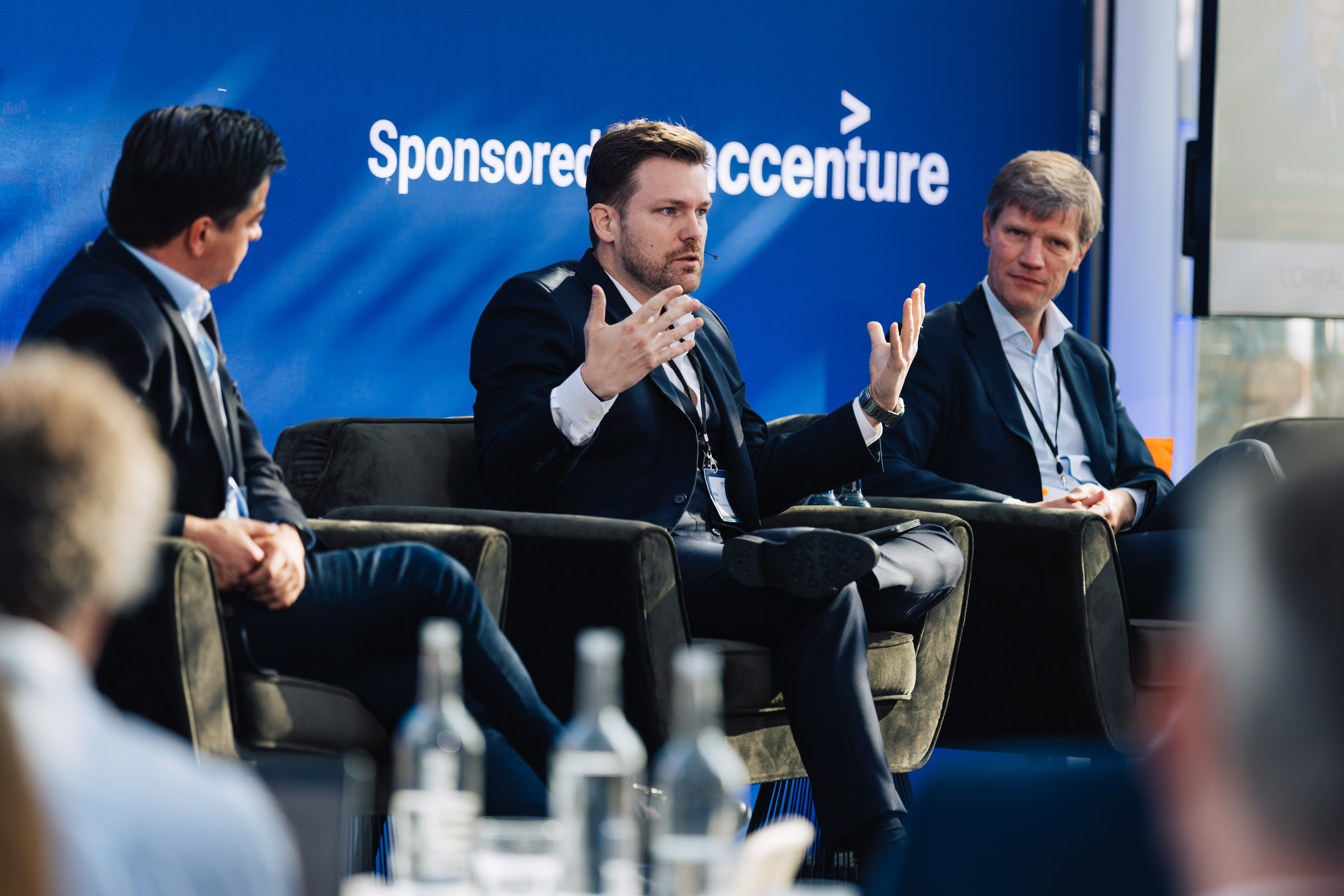In the rapidly evolving landscape of the consumer products industry, the integration of artificial intelligence (AI) is no longer a futuristic concept but a present-day necessity.
The Veeva Consumer Products EU Summit brought together industry leaders to discuss the transformative power of AI and digitalization in functions like quality, health & safety, regulatory, and product marketing claims.
In this post, we unveil the most valuable best practices from our panelists during the keynote session, "Navigating Digital Transformation in the Era of AI." These insights not only framed the Summit but also underscored the strategic integration of AI to boost efficiency and effectiveness in current processes.
The keynote panel included Alberto Prado, Global Head of R&D Digital & Partnerships at Unilever, Matthieu Cassier, Chief Digital & Transformation Officer, Research & Innovation at L’Oreal, and Stefan Vos,
Industry X Lead for Consumer Goods Europe at Accenture, and was moderated by Veeva Consumer Products Strategy Leader Ed Van Siclen.
Insight #1 While Transformative, Start Small and Strategic with AI
 "AI is transformative. It is a moment in time that we should all embrace,” said Van Siclen. “What you're trying to do is build more personalized products, reduce the time to market, and deal with ever-expanding regulatory issues—all at scale."
"AI is transformative. It is a moment in time that we should all embrace,” said Van Siclen. “What you're trying to do is build more personalized products, reduce the time to market, and deal with ever-expanding regulatory issues—all at scale."
This session underscored AI's transformative impact on the consumer products industry. From speeding up product development to enhancing regulatory compliance and consumer engagement, AI is not just a tool but a strategic asset that companies must embrace.
"Transformation is not a discrete event; it’s about embedding transformation and agility in your DNA,” said Prado. “We need to balance the potential of AI without over-regulating it, ensuring that we don't miss any opportunities while maintaining compliance."
However, the panelists cautioned against going too big too fast in chasing the promise of this new technology, especially when they lack the platform and data infrastructure to maximize its value. Instead of attempting to overhaul entire systems, companies should focus on specific areas where AI can significantly enhance efficiency. Treating AI as a digital assistant can improve and accelerate tasks, making the transformation more manageable and impactful.
L’Oreal’s Cassier shared gave insight into how they evaluate AI use cases for their R&D function. “For people, for scientists, we want [technology] to do three things: one is to make their life easier…like finding your document, all those types of very basic things. The second one is how much do we amplify their innovation expertise. And third is how much do we help them to make a good decision.”
The journey towards digital transformation does not require an overhaul of existing systems overnight. Instead, as highlighted by Ed Van Siclen of Veeva during the keynote, companies should focus on "starting small and strategic with AI." This was echoed by Vos, who put forth this framework to set up for success: “think big, start small, and then scale smart.” By implementing AI in specific areas, businesses can significantly enhance efficiency and effectiveness without disrupting their entire operations.
Insight #2 Cultivate a Data-First Mindset
Embracing AI requires a robust data infrastructure. Companies like Unilever and L'Oréal are leveraging comprehensive data collection to deepen customer engagement. For instance, L'Oréal's New Beauty initiative uses customer data to recommend the best products for individual skin types, creating a personalized experience with existing products.
Beyond consumer data, R&D leaders stressed the need for “good data hygiene” across the product development life cycle. Unilever’s Prado put it bluntly “It's not just about having data - the intrinsic value of data is zero. It is what you do with it that creates value.”
With so many individuals and departments contributing to and utilizing R&D data, Prado continued, they are required to continuously ask themselves “is the correct data available? Is it accessible? Is it of the right quality to do the job? Is it timely available, because data has in some use cases, an expiry date, you need it here and now. And if it comes in in a week's time, then then it loses value.”
Insight #3 Prioritize Integrated Platforms for AI
A key theme of the conversation was the necessary shift from bespoke IT solutions to integrated platforms in order to handle AI’s extensive data requirements. Unified platform’s ability to consolidate processes, data, and documents enables meaningful and scalable AI applications across the organization, driving productivity and innovation.

Accenture’s Vos painted a clear picture of how to develop the “north star” for connected platforms across complex business functions. Take for example regulatory, where leadership is seeking to establish “one view on the regulatory landscape of the world.” This simply isn’t possible using spreadsheets or bespoke solutions. He challenges his clients to think about, “How can I bring that real-time [regulatory] information in a meaningful way to all the different stages of my innovation? So that my people, who work on reformulation, if they have a new formula immediately get a ‘traffic light view’ of this formulation. Is it good to go - green light - for all the markets I target? And you can do that for all stages.”
So how do you start that journey? Vos connected to our first insight of starting small and scaling smart. “You have to have clarity on what kind of platforms you want. And then let's say start in one area, really focused with one high-impact application, and make it work. You let the platform ‘land’ with one application that drives the adaptation, and make sure that the organization pivots to working on this platform.”
The need for robust data infrastructure was another critical point discussed. Alberto Prado of Unilever emphasized the shift from bespoke IT solutions to integrated platforms that can handle extensive data requirements. This shift enables meaningful and scalable AI applications across the organization, ensuring that AI's potential is fully exploited.
Insight #4 Reimagine Your Upskilling and Talent Retention Approach
“Gen AI has changed the rules of the game,” Prado reflected. “I don't need to know how to code, it codes for me, I just need to tell it what the program should do.
.jpg?width=397&height=265&name=Veeva_Summit_Europe_2024-43%20(2).jpg)
While this statement may intimidate some leaders in the consumer product industry, overall the panel was optimistic about AI’s potential business impact and how it is “leveling the playing field massively in terms of access to technology” compared to even a few years ago. Rather than teaching research scientists how to code, for example, AI is opening up new and incredible collaboration possibilities for R&D.
“You don't have to be a biologist and technologist,” Prado said. “You don't have to understand technology - you can talk to it. We realized we need very good domain expertise people, people that really understand the science domain that they're in, not necessarily the technology because it's so intuitive now that you can engage in natural language.”
This is also impacting how digital leaders within consumer product enterprises collaborate with their business partners. L’Oreal’s Cassier shared this helpful analogy for aligning teams on the right level of transformation or change a new technology is poised to bring.
“The way we look at our digital transformation is that we put ourselves in a ‘farmer spirit.’
- Are you giving a map to the farmer? This is digitization. You know where to plant the seed.
- Are you constructing an electronic tractor that will be much faster, automated? Probably you don't need a driver, but still a lot of constraints: the weather you don't control, the sun you don't control, the size of the field you can’t control.
- Or are we building vertical farming? Vertical farming is digital transformation.
At the end of the day you reconsider the full picture” Cassier said.
Insight #5 Invest Energy in Governance and Compliance (Or Regret It Later)
With the increasing integration of AI, establishing robust governance models to manage ethical and regulatory aspects is imperative. Vos highlighted the importance of making digital and AI an integral part of validation processes to maximize their potential.
Bringing a direct industry perspective, Unilever’s Prado shared that they have “implemented a data governance model that helps [determine] who owns this data. Who is responsible for ensuring the quality of this data, who is responsible for extracting value? And this is where things get complicated, because in large organizations, the team that is responsible for generating and protecting the quality of the data may not be the ones that actually take advantage of it.”
Engage Further - Watch Veeva Summit Sessions On-demand
This year’s Veeva Consumer Products EU Summit highlighted the transformative potential of AI in the consumer products industry. We encourage you to watch the full conversation between these panelists on-demand.
By starting small and strategic, cultivating a data-first mindset, and prioritizing integrated platforms, companies can harness the power of AI to deliver superior products and exceptional consumer experiences. The insights shared by industry leaders underscore the importance of embracing digital transformation and fostering a culture of continuous learning and innovation.
Learn more about how Veeva is helping consumer products companies innovate faster and differentiate in the digital age.
SHARE






